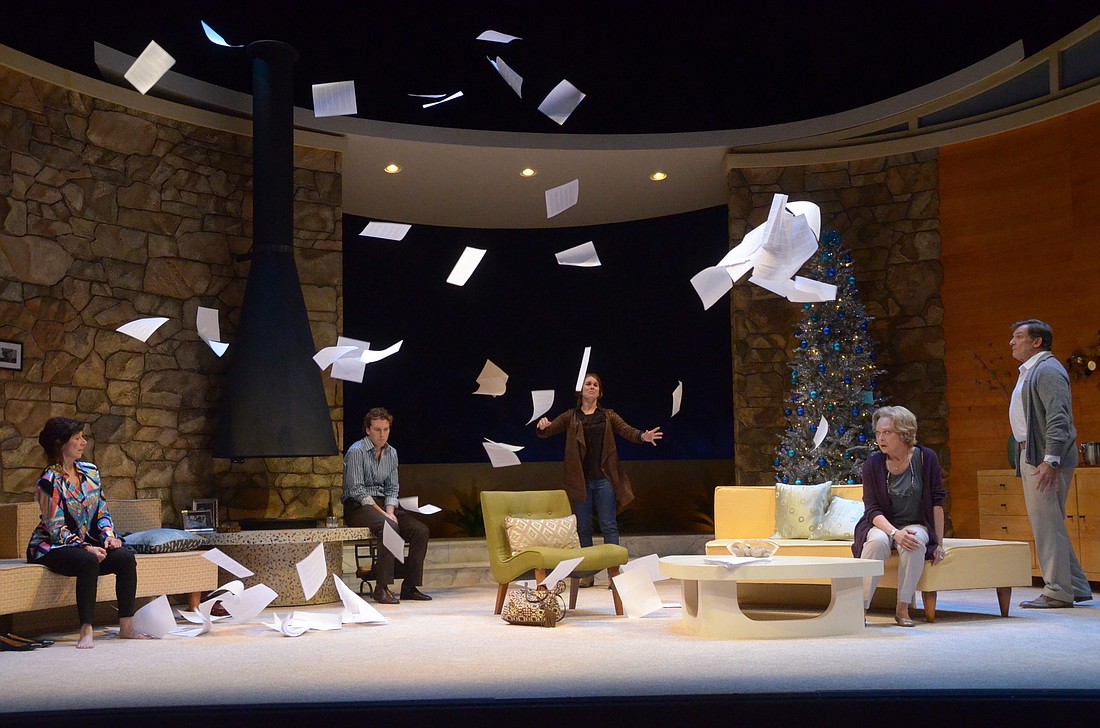- May 27, 2025
-
-
Loading

Loading

America has been the arena for a running brawl between the Left and Right since before Upton Sinclair was in diapers. For some, the factional fight is a family feud. The Asolo Rep’s production of Jon Robin Baitz’s “Other Desert Cities” introduces us to one such family. Meet the Wyeths! They’re an HBO sitcom-worthy grab bag of dysfunctionality. They’re living in Palm Springs — and learning lessons about life and love.
Aunt Silda is a happy dry drunk. Mom and Dad are two rock-ribbed Reagan Republicans named Polly and Lyman. Their son, Trip, produces a cheesy reality TV show. Their daughter, Brooke, is a writer who just can’t make it in the real world.
Baitz (a Hollywood refusnik) draws us in with happy sitcom rhythms. It’s a trick. You put your guard down — then he hits you. Dark material surfaces, written material. After a long bout of writer's block and a spell in a mental institution, Brooke is about to publish a tell-all memoir spilling a painful family tragedy all over its pages. Back in the 1970s, Brooke’s older brother, Henry, helped some Weather Underground-variety radicals blow up an Army recruiting center, burning a janitor alive in the process. According to Brooke’s memoir, Henry came to his parents for help. They rejected him, and he killed himself. Brooke’s book blames her parents and their rigid Republican values. Liberal hope fiend that she is, Brooke wants her parents’ approval before she publishes this book. She does not get it.
Director Greg Leaming gets it. He unpacks Baitz’s dense text and makes you feel like you’re looking at real human beings interacting in space and time. A good play doesn’t feel like a play; it feels like eavesdropping. In Leaming’s hands, that’s what you feel. That, and a sense of tension. It’s a tough trick to pull off, but he does it.
Call it the boiling-frog trick. Put the frog in the pot and turn up the heat. Do it slowly, and the frog never notices. Baitz’s play starts out in sitcom land. Slowly, slowly, it takes you into the boxing ring — as it should.
A good play is like a prize fight. The playwright announces the contenders. In this corner: a liberal writer. In that corner: her old-school Republican parents. Fight!
The fight feels rigged at first. You get the sense the playwright tied Lyman and Polly’s hands behind their backs to make them easy targets for Republican bashing. Lyman is a Hollywood actor who specialized in death scenes and found a second life as a right-wing policy flack. J. Kenneth Campbell plays him with the right note of Ted Baxter slickness. Polly (Lauren Klein) is a Texas fireball with an acid wit and an absolute conviction that the right way and her way are the same thing. Mom and Dad feel like upscale Archie Bunkers; strawmen, designed to be dislikable. And, boy, does Brooke dislike them. Her memoir indicts them for her brother’s suicide — a bomb she drops at Christmas. Brooke’s body language indicts them, too.
Lucy Lavely plays this character as a smoldering mass of need, hurt and anger. But, in her passive-aggressive way, Brooke is just as combative as her mom — and the fight goes on. Brooke’s brother, Trip, and her aunt stay safely behind the ropes while making color commentary. Trip seems to be the only one with any sense in the Wyeth family. Benjamin Williamson plays him with the knowing sneer of a young Jack Nicholson. Brooke’s addled Aunt Silda has her own kind of sense. It’s an intermittent intelligence, flickering on and off like an old neon sign. Carolyn Michel gets into this character’s skin. Her performance is a comic, crowd-pleasing delight.
The Wyeth bout unfolds in the arena of a mid-century modern manse crafted by Judy Gailen. This family may be miserable, but they live in a really cool house.
So, who wins the fight?
That would be telling. At root, fights about politics are fights about philosophy. There’s an obvious philosophical counter to Brooke’s blame: Your brother had blood on his hands. Blame him, not us. It’s the obvious thing to say, but her parents never say it. Strawmen, right? Wrong. What I assumed was dishonesty was a feint. Baitz cleverly tricks you into buying Brooke’s damning judgment of her parents. He gets you on Brooke’s side. He manipulates you into believing the character assassination of a book you haven’t read. Then he hits you with his final sucker punch. I won’t spoil it. But I will say: The arguments of the Left and Right can feel as scripted as championship wrestling. Each has its stock cast of good guys and bad guys. Each has its standard rants. But the human heart is more complicated than that. The human family is, too.
That should come as no surprise.
IF YOU GO
“Other Desert Cities” runs through Feb. 27, at the FSU Center for the Performing Arts, 5555 N. Tamiami Trail, Sarasota. Call 351-8000 or visit asolorep.org for more information.